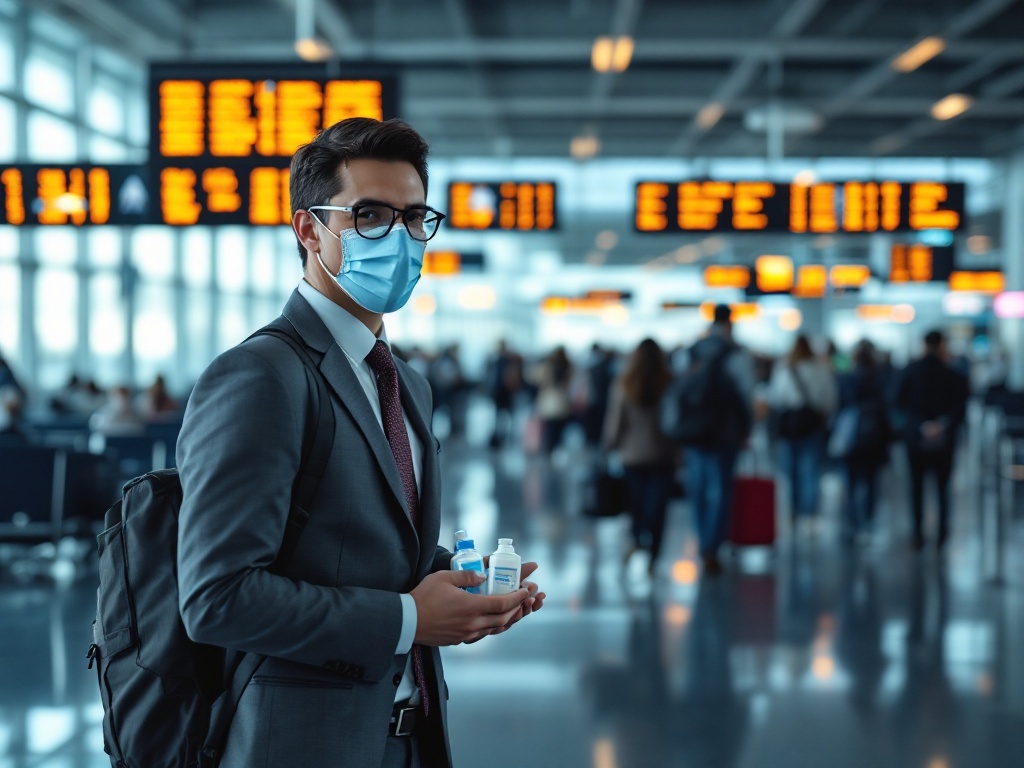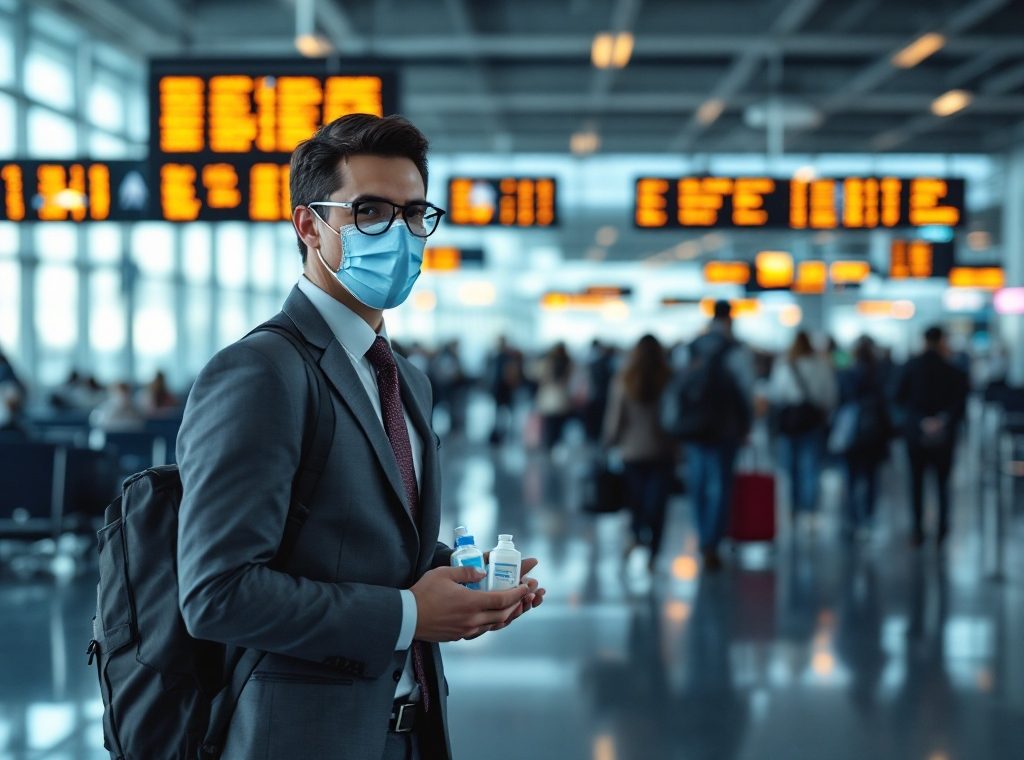Health and Safety: Travel Safety Tips for Business Travelers During Flu Season
Traveling for business during flu season? Protect yourself from illness with crucial health tips. Learn how to minimize infection risks with pre-travel doctor consultations, vaccinations, and a well-stocked health kit. Discover effective hygiene practices, mask usage, and strategies for avoiding crowded spaces. Read on to stay healthy and productive on your next business trip.
Important information

- Get a flu shot at least two weeks before your trip to develop immunity.
- Consult your doctor 4-6 weeks before traveling to discuss your health needs.
- Pack a travel health kit with medications, hand sanitizer, and a mask.
- Practice good hand hygiene and avoid touching your face.
- If you feel sick, postpone travel if possible. If you get sick while traveling, isolate, hydrate, treat symptoms, and seek medical advice if needed.
Understanding Health and Safety for Business Travelers During Flu Season
Traveling for business, especially during flu season, increases your risk of infection. Air travel, in particular, elevates this risk due to enclosed spaces and close proximity to other passengers. However, you can significantly reduce these risks by taking simple precautions. Good hand hygiene is crucial. The CDC recommends getting a flu shot at least two weeks before your trip to allow enough time for immunity to develop. This is particularly important for individuals with pre-existing health conditions. A pre-travel consultation with your doctor four to six weeks before departure is also recommended. This allows you to discuss your specific health needs and receive personalized advice. Packing a travel health kit is another essential step. Include over-the-counter medications, hand sanitizer, and a mask. Lastly, familiarize yourself with flu symptoms, such as fever, body aches, fatigue, and cough, to manage them effectively should they occur.
Flu Season: Risks and Precautions
Traveling during flu season increases your risk of getting sick. The virus spreads through droplets released into the air when someone coughs, sneezes, or talks. Enclosed spaces like planes and trains heighten this risk, making it easier to breathe in the virus. Additionally, airports and hotels are breeding grounds for germs. You can protect yourself by washing your hands often and avoiding touching your face. Getting vaccinated is crucial. The CDC offers helpful health advice.
Tips for Healthy Travel During Flu Season
- Wash your hands frequently.
- Avoid touching your face.
- Get vaccinated.
- Consult resources like the CDC for health guidance.
Why is travel risky during flu season?
- Airborne transmission: The flu virus spreads through droplets in the air.
- Enclosed spaces: Planes and trains increase the risk of inhaling the virus.
- Germ hotspots: Airports and hotels harbor numerous germs.
Understanding the Risks of Traveling During Flu Season
Traveling during flu season increases your risk of infection. Airports and airplanes, being confined spaces with close proximity to others, facilitate viral transmission. Check destination health advisories for information on outbreaks. To minimize exposure, consider traveling during less crowded times, such as weekdays or early mornings.
Check Destination Health Advisories. Be aware of any outbreaks at your destination by checking health advisories.
Travel During Off-Peak Times. Minimize exposure by traveling during less crowded periods like weekdays or early mornings.
CDC Recommendations for Vaccination Timing
Get your flu shot at least two weeks before traveling for optimal protection. This allows your body to develop protective antibodies, as recommended by the CDC. Planning ahead ensures your immunity is fully effective during your trip.
Essential Travel Safety Tips for Business Travelers
Stay healthy on your business trips during flu season. Get a flu shot at least two weeks before traveling. Check flu activity levels at your destination. Wash your hands often, stay hydrated, and avoid touching your face. Eat vitamin-rich foods to boost your immunity and be careful in crowded places.
Before Your Trip
- Get a flu shot at least two weeks prior to your trip.
- Research flu activity levels at your destination.
During Your Trip
- Wash your hands frequently.
- Stay hydrated.
- Avoid touching your face.
- Maintain a healthy diet with vitamin-rich foods.
- Exercise caution in crowded settings.
Additional Precautions
- Consider wearing a mask, especially during peak flu season and in crowded areas. Surgical masks or KN95s offer good protection.
- Travel during off-peak times to minimize exposure.
- Sanitize surfaces like airplane seats using sanitizing wipes.
- Maintain physical distance from others whenever possible.
If You Feel Sick
If you feel sick before your trip, postpone it if possible. If travel is unavoidable, wear a mask, particularly in crowded areas.
Should you catch the flu while traveling:
- Isolate yourself in your hotel room.
- Stay hydrated.
- Manage symptoms with appropriate medications.
- Maintain good hygiene practices.
- Seek medical advice if symptoms persist, possibly through telemedicine services.
Monitor your health upon your return. Postpone travel if you feel unwell. Maintain a clean workspace and keep your distance from colleagues. If you get sick, stay home and use virtual communication tools. A well-stocked health kit is a good idea.
Importance of a To-Go Health Kit
A well-stocked health kit is essential for business travel. It allows quick access to important items like hand sanitizer, disinfectant wipes, and a thermometer for health monitoring. Pack remedies for common ailments like colds and flu. Include vitamins or immune boosters to maintain your health while traveling. Remember to bring extra masks and tissues. Being prepared for minor health issues can significantly impact your trip’s success.
Hand Hygiene Practices
Wash your hands thoroughly with soap and water for at least 20 seconds to eliminate germs.
If soap and water are unavailable, use a hand sanitizer with at least 60% alcohol.
Regularly disinfect frequently touched surfaces like tray tables and armrests.
Cover coughs and sneezes with a tissue or your elbow.
Getting a Flu Shot
Protect yourself from the flu, especially during travel, by getting vaccinated. This safeguards your health and reduces the spread of the flu to others. For the best protection, get vaccinated at least two weeks before your trip to allow your body to build immunity.
Practicing Good Hygiene and Avoiding Face Touching
Wash your hands frequently with soap and water for at least 20 seconds.
If soap and water are not available, use a hand sanitizer with at least 60% alcohol.
Avoid touching your eyes, nose, and mouth.
Regularly disinfect frequently touched surfaces such as doorknobs, tray tables, and armrests.
Additional Measures to Reduce Germ Exposure
Wearing a mask is a simple yet effective way to reduce the spread of respiratory droplets, especially in crowded areas like airports and airplanes. This practice protects both you and your fellow travelers.
Minimize exposure to germs by avoiding large groups. When this isn’t possible, maintain a safe distance from others. On flights, direct the air vent towards your face to create a protective barrier. During layovers, find less crowded areas within the terminal and avoid touching handrails.
Frequent handwashing and the use of hand sanitizer are essential for maintaining hygiene and promoting health and safety during travel.
- Wash your hands thoroughly and often, especially after using the restroom and before eating.
- Use hand sanitizer with at least 60% alcohol content when handwashing isn’t feasible.
- Avoid touching your face, especially your eyes, nose, and mouth.
The Role of Masks in Reducing Respiratory Droplet Spread
Masks are a powerful tool for limiting the spread of germs. By blocking respiratory droplets, they significantly reduce exposure to illnesses. Studies show this reduction can be anywhere from 50% to 80%, a substantial decrease, especially beneficial in crowded areas like airports and on airplanes. Furthermore, masks help prevent the spread of viruses such as the flu, offering crucial protection for everyone.
Avoiding Crowded Places and Safe Travel Practices
Minimize your flu risk while traveling by following these simple precautions:
Avoid crowded airports during peak travel times. Consider traveling during off-peak seasons or at less congested times to reduce exposure to large crowds.
Choose private transportation. Opt for a private car or ride-sharing service instead of public transportation to minimize close contact with others.
Maintain physical distance. Even in moderately crowded areas, keeping a safe distance from others effectively lowers transmission risks.
Select less-traveled destinations. Explore less popular destinations and travel during the off-season to limit potential exposure to the flu.
Prioritize private accommodations. Choose private villas, rooms with balconies, or other accommodations that offer enhanced privacy compared to shared dormitories.
What to Do If You Get Sick While Traveling
If you develop flu-like symptoms, such as fever, cough, or body aches while traveling, seek immediate medical attention. Consult a healthcare professional, either in person or via telemedicine if available, and inform them about your recent travels. Your embassy or travel insurance provider can assist in locating local clinics. If your symptoms worsen or persist, don’t hesitate to seek further medical help.
Recognizing Flu Symptoms and Seeking Medical Attention
While traveling, if you experience common flu symptoms like fever, cough, body aches, and fatigue, seek immediate medical attention.
More serious symptoms such as difficulty breathing, persistent chest pain, severe fatigue, or confusion require urgent care.
Plan ahead by researching local urgent care centers and clinics, many of which offer online scheduling and virtual consultations.
After returning home, continue monitoring your health.
If flu-like symptoms develop, prioritize rest and hydration.
If symptoms worsen or persist, contact your healthcare provider.
Embassies and travel medical clinics can also provide local medical assistance, often with English-speaking doctors available at international clinics.
Utilizing Telemedicine and Available Medical Assistance
Telemedicine offers a significant advantage for business travelers: remote consultations with doctors. Imagine feeling unwell on a business trip. Instead of searching for a local clinic, you can quickly connect with a physician through telemedicine. From your hotel room, describe your symptoms, receive a diagnosis and treatment plan, and even get prescriptions or recommendations. Many hotels and travel insurance providers now offer these services, making healthcare readily accessible while traveling.
Maintaining Productivity and Employee Health During Travel
Prioritize everyone’s well-being by postponing travel if you’re feeling unwell. This simple act is vital for preventing the spread of illness. After your trip, monitor your health for any developing symptoms, such as fever or cough. If you feel sick, seek medical attention promptly.
Deferring Travel When Necessary
If you are feeling unwell or are at higher risk of serious illness, prioritize your health and postpone business travel. This not only protects your well-being but also prevents the spread of germs to others. Simply reschedule your trip for when you have fully recovered, protecting both yourself and your colleagues.
Monitoring Health After Travel
Monitor your health for a week after returning from your trip.
If you develop flu-like symptoms, prioritize rest and hydration.
If your condition worsens or doesn’t improve, seek medical attention.
Inform your doctor about your recent travel, detailing your symptoms and any potential exposure to illness during your trip.















